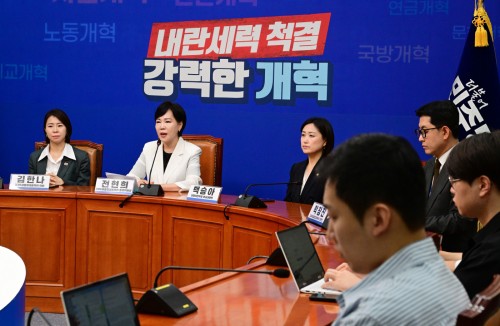 |
| Jeon Hyun-hee (second from left), chair of the Democratic Party’s task force on the three major special counsels, speaks during a press conference at the National Assembly on August 31, outlining the party’s response to the second phase of investigations aimed at completely closing rebellion cases. / Photo by Lee Byung-hwa |
The Democratic Party of Korea (DPK) is set to push ahead with a sweeping package of reforms under the banner of “national normalization” as the regular parliamentary session opens on September 1. The agenda includes 224 priority bills covering reforms in prosecution, media, judiciary, economy, and public safety.
The National Assembly will hold an opening ceremony on Monday afternoon, kicking off a 100-day session. Floor speeches by party leaders are scheduled for September 9, followed by a series of interpellations of the government from September 15 to 18, covering politics, diplomacy, security, economy, education, and other areas.
During the questioning, the ruling People Power Party (PPP) is expected to criticize what it calls the Lee Jae-myung administration’s “one-sided governance.” The DPK, meanwhile, will highlight the failures of the Yoon Suk Yeol administration and stress the need for complete closure of the “rebellion” cases through institutional reform.
Cabinet confirmation hearings are also on the calendar. Education Minister nominee Choi Kyo-jin and Financial Services Commission nominee Lee Eok-won will face hearings on September 2, followed by Fair Trade Commission nominee Joo Byung-ki on September 5. A nominee for the vacant post of Minister of Gender Equality and Family is also awaiting scrutiny.
The DPK has pledged to focus this session on four pillars—livelihood, growth, reform, and safety—anchored by 224 legislative priorities. A key target is amending the Government Organization Act to fully separate investigative and prosecutorial powers, completing the so-called “prosecution reform.” Amendments to the three major special counsel laws—covering rebellion charges, allegations linked to Kim Keon-hee, and the death of Army Corporal Chae—are also on the list, along with revisions to curb “parachute” appointments at public institutions.
The party plans to use its majority to push bills through, resorting to the fast-track mechanism where opposition committee chairs block progress. Media reform introducing punitive damages against both traditional and online platforms and an expansion of the number of Supreme Court justices are also under consideration.
A controversial proposal involves establishing a special tribunal for rebellion cases, including alleged crimes tied to the December 3 martial law incident. The bill, spearheaded by Rep. Park Chan-dae, would create dedicated courts at the Seoul Central District Court and Seoul High Court, with special warrant judges and panels appointed through a committee representing the National Assembly, judiciary, and bar association. Proponents argue this ensures independence, while critics warn it undermines judicial authority.
Although DPK leaders say the issue has not been formally discussed at the top level, there is growing consensus within the party. On Sunday, Rep. Jeon Hyun-hee, who chairs the DPK’s task force on special counsels, said, “We will put all our efforts into passing the Special Rebellion Law, which includes establishing a dedicated tribunal.”
The PPP, however, strongly opposes the idea, calling it akin to a “people’s court.” Floor leader Song Eon-seok said, “The very concept of a special counsel already weakens the prosecution. Now they want to paralyze the judiciary with a special tribunal? That’s unthinkable.” He added, “In our history, a special tribunal was convened only once during the post-liberation purge of pro-Japanese collaborators. To attempt it again is nothing short of dictatorship. We will fight this to the end.”
Most Read
-
1
-
2
-
3
-
4
-
5
-
6
-
7





















